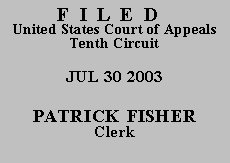

| UNITED STATES OF AMERICA, | No. 02-3320 |
We have fully examined the proceedings as required by Anders, 386 U.S. at 744, and conclude that there are no issues besides the one raised in the Defendant's brief that warrant consideration. We review the district court's decision whether the Defendant is eligible for safety valve relief under the Sentencing Guidelines for clear error. United States v. Roman-Zarate, 115 F.3d 778, 784 (10th Cir. 1997). Thus, we will not reverse the district court unless its decision is "without factual support in the record" or unless "we are left with a definite and firm conviction that a mistake has been made." United States v. Beaulieu, 893 F.2d 1177, 1182 (10th Cir. 1990). The Defendant must bear the burden of showing, by a preponderance of the evidence, that the § 5C1.2 safety valve provision applies. United States v. Verners, 103 F.3d 108, 110 (10th Cir. 1996). If, however, the Defendant meets the requirements of § 5C1.2, application of the safety valve provision is mandatory. Id. at 110 n.3.
Section 5C1.2 allows district courts to avoid imposing the statutorily mandated minimum sentence, and apply a lower sentence generated by the Guidelines instead, if the Defendant satisfies five criteria.(2) U.S.S.G. § 5C1.2; 18 U.S.C. § 3553(f). There is no dispute that the Defendant meets the first four criteria of § 5C1.2. (App. at 42.) The issue is whether the Defendant complied with subsection (a)(5), which requires a defendant to truthfully tell all he knows to the government concerning his offense. U.S.S.G. § 5C1.2(a)(5); Verners, 103 F.3d at 110.
At the sentencing hearing, the district court awarded the Defendant a three-level downward departure for acceptance of responsibility. (App. at 51, 64.) See U.S.S.G. § 3E1.1(a) and (b). Based on an offense level of 29 and a criminal history category of I, the Guidelines generated a sentencing range of from 87 to 108 months imprisonment. Under 21 U.S.C. §841(b)(1)(A), however, the statutory minimum term of imprisonment is 120 months. Thus, if the district court had found § 5C1.2 applicable, it would not have been bound by the statutory minimum sentence of 120 months and the Defendant would have received a shorter sentence.(3)
Defense counsel objected to the Presentence Report at the hearing because it did not recommend application of the safety valve provision. (App. at 4251.) The district court heard argument on the issue, but determined that the Defendant did not "provide[] all relevant information concerning this offense" (id. at 50) and therefore refused to apply the safety valve provision. We conclude that it was not clear error for the district court to reach this conclusion.
Defense counsel argued at the sentencing hearing that the Defendant provided the police with all of the information he possessed about the drug delivery with which he was involved. Although the Defendant did provide some information to the police, the district court concluded that he was not truthful in doing so. For example, the district court pointed to the fact that the Defendant was unable to locate his own home after being driven to the Kansas City neighborhood he claimed to live in by police officers. (App. at 48.) Despite the fact that the Defendant claimed to have lived there for only a short time, there is evidence that he told police officers that during that time he had driven around the city, making it unlikely that he did not, in fact, know where he lived. (App. at 48.) The court, therefore, concluded that the Defendant had deceived the police as to the location of his residence.
Because there is a factual basis in the record for the district court's refusal to apply the safety valve provision, see Beaulieu, 893 F.2d at 1182, we find that it was not clear error for the district court to have refused to apply § 5C1.2. The Defendant's sentence is AFFIRMED, and we GRANT counsel's motion to withdraw.
ENTERED FOR THE COURT
David M. Ebel
Circuit Judge
*. After examining appellant's brief and the appellate record, this panel has determined unanimously that oral argument would not materially assist the determination of this appeal. See Fed. R. App. P. 34(a)(2) and 10th Cir. R. 34.1(G). The case is therefore ordered submitted without oral argument. This Order and Judgment is not binding precedent, except under the doctrines of law of the case, res judicata, and collateral estoppel. The court generally disfavors the citation of orders and judgments; nevertheless, an order and judgment may be cited under the terms and conditions of 10th Cir. R. 36.3.
1. The November 1, 2001, edition of the sentencing guidelines applied to the Defendant's case. (App. at 63.)
2. The criteria are that:
U.S.S.G. § 5C1.2(a).
3. In addition to freeing a defendant from the application of the statutorily mandated minimum sentence, § 5C1.1 works in conjunction with § 2D1.1(b)(6) to decrease a defendant's offense level by two levels. U.S.S.G. § 2D1.1(b)(6).